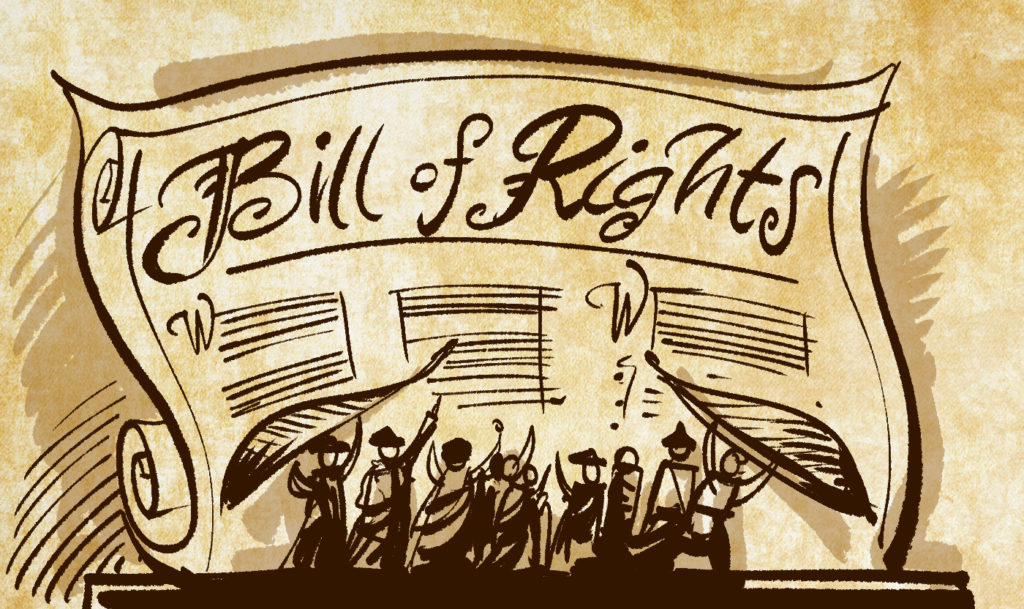Press, candidates flub discussion of abortion, privacy and the courts
This month’s Democratic presidential debate descended into confusion when candidates discussed the Supreme Court and abortion. The candidates threw around jargon that probably confused many Americans and seemed to confuse each other. None of the candidates had a cogent answer and the press didn’t begin to untangle the mess.
There was mention of the Ninth Amendment, unenumerated constitutional rights, litmus tests and packing the court. But the candidates didn’t explain much of anything. Nor did the press.
New Hampshire had promised to be a place where the candidates addressed abortion and the courts in detail. For the first time, abortion and the courts were a major focus of a debate and there was a separate candidate forum on reproductive rights as well. But only one news organization – the New York Times – wrote a separate story on abortion and judges, according a LexisNexis search. And that piece did little to explain what the candidates were talking about.

Although Biden based his answer on the Ninth Amendment and unenumerated rights, not a single news story published in the United States this month used those words, according to LexisNexis.
Sometimes it is as important to look at what the media isn’t explaining as what it is. That’s particularly true with the Supreme Court and privacy rights, which seldom become major presidential election issues despite their importance to the liberties Americans enjoy.
Packing the court
During the debate, Pete Buttigieg advanced his idea of packing the Supreme Court with six more justices. The idea is a throwback to Franklin Roosevelt’s huge mistake trying to pack the court after his landslide victory in 1936.
Roosevelt was tired of the Supreme Court throwing out major components of his New Deal.
But even the big Democratic majorities in Congress wouldn’t go along with court packing. Fortunately for FDR, Justice Owen Roberts switched sides on New Deal cases and the president started winning. It was called the Switch in Time that Saved Nine.
Just as Buttigieg doesn’t appreciate that history has rendered its verdict on court packing, former Vice President Joseph R. Biden showed a hazy grasp of the constitutional basis of unenumerated rights, including the abortion right.
Biden headed off in a sensible direction during the New Hampshire debate by saying he would ask prospective justices if they thought the Constitution protects “unenumerated” rights, not listed in black-and-white – rights such as privacy, abortion, contraception, marriage.
But then Biden got stuck in a time warp advocating long-discarded views of where these rights come from in the Constitution. Biden embraced the magical reasoning of the 1965 decision of Griswold v. Connecticut – a case decided the year Biden went to law school. In Griswold the Supreme Court threw out a state law that made it a crime to use a “drug, medicinal article or device” to prevent conception. The court said the law violated the right of privacy.
Throwing out the law made sense. Laws against contraception violated the basic rights of women. But the justices’ reasoning in Grisold did not make sense. The justices couldn’t agree where to find that right to privacy, which is never mentioned the text.
Penumbras of rights
Justice William Douglas said privacy was to be found in the “penumbras”- or outer, lighter shadows – cast by various parts of the Bill of Rights. Three other justices said privacy was a right protected by the Ninth Amendment, which says the Constitution’s enumeration of particular rights does not deny the existence of other rights not enumerated.
Biden, in his debate answer, relied on the Ninth Amendment. In a previous discussion with the New York Times editors he mentioned Douglas’ penumbras.
But Dougals’ penumbras have long been ridiculed and discarded. And the Ninth Amendment never has been the basis of a Supreme Court ruling recognizing new rights. Never.
One thing shocking about Biden’s answer is that he was the chair of the Senate Judiciary Committee. He should know better. Biden also was off on his history when he took credit for stopping Robert Bork’s nomination. It was really Sen. Edward M. Kennedy, D-Mass. – and Bork’s arrogance – that stopped Bork.
Amy Klobuchar seemed headed in a sensible direction during the debate by rejecting litmus tests on abortion. She said she would instead insist a candidate for the court abide by precedent, which would include Roe.
That would be a neutral principle both Republican and Democratic presidents could apply to court nominees. But what about the precedents that Klobuchar doesn’t like – Citizens United protecting unlimited corporate spending on behalf of political candidates and Heller, guaranteeing the individual right to own a gun in one’s home for protection. Is she going to insist on adherence to those 5-4 precedents too?
Bernie Sanders supporters rejoiced he had cut through the gobbledygook by saying flat out he would have a Roe v. Wade litmus test for all judges. “I will never nominate any person to the Supreme Court or the federal courts in general who is not 100 percent pro-Roe v. Wade,” he said.
But there is a reason past presidents have rejected litmus tests. Many legal scholars think it is highly improper to force a nominee to promise how to vote on an issue that may come before the court in the future. It denies one side or the other an unbiased court.
Liberty protected by due process
So where do these unenumerated constitutional rights to privacy come from in the Constitution?
In Roe the Supreme Court did not rest the abortion right on the penumbra of the Bill of Rights or on the Ninth Amendment, as Biden suggested. It rested it on the “liberty” protected by the due process guarantee of the 14th Amendment, which was ratified after the Civil War.
This is pretty important to know – particularly if you want to be president – because those words in the 14th Amendment are part of the constitutional basis for all sorts of unenumerated rights Americans take for granted – same-sex marriage, interracial marriage, the right to decide how many children to have, the right to decide which family members live under one’s roof and the right of parents to send their children to parochial school in the face of anti-Catholic prejudice. On top of that, the words are the reason that states have to abide by most of the provisions of the Bill of Rights because they are part of the liberty protected from state interference.
What all these liberties protected by the 14th Amendment’s due process clause have in common is a principle that conservatives and liberals generally agree on: the government shouldn’t tell people what to believe, whom to marry, whom to live with, whether and when to have children, what school to send them to and what family members to welcome into their homes.
Even though conservatives and liberals generally want to keep the government out of their families and private decisions, most of the conservative justices appointed by Republican presidents don’t believe that the Constitution protects unenumerated privacy rights. Like the late Justice Antonin Scalia, they are originalists who don’t believe in a living Constitution that grows with the passage of history.
President Trump – who says he wants judges who will overrule Roe – has made nominations to the Supreme Court in the Scalia mold, creating a majority on the court for that narrow view of privacy rights.
The presidential candidates and the press need to do a better job of explaining the constitutional issues in the 2020 presidential election. Americans’ fundamental liberties and their right to be let alone by their government could be at stake.
William H. Freivogel is the publisher of Gateway Journalism Review and a journalism professor at Southern Illinois University at Carbondale.


